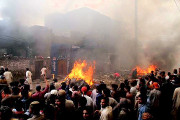Special Correspondent, ASSIST News Service
NEW DELHI, INDIA (ANS) -- False blasphemy charges and fabricated accusations are increasingly being used by religious hate groups to organize persecution against Christians not only in Pakistan, but also in next door India. In both cases, there are similar devastating results, usually carried out as police and government officials stand back watching the violence.
 |
An Indian church being burned
|
The pattern seems to be well organized. The extremists target an indigenous Christian missionary, file false charges with police, begin the rumor campaign and organize mob action.
Similar organized rumor campaigns in Lahore, Pakistan last week caused a frenzied mob of 3000 vandals to burn down 200 Christian homes and two churches. Police evacuated the Christians and stood by watching as the mob destroyed an entire Christian community. In that case, a street sweeper was accused of "blasphemy" by a friend.
Communal violence is not just limited to the northern areas of South Asia, where an organized "hate belt" historically runs from Lahore in Pakistan through the Pakistan and Hindu Punjab and all the way to Patna in Bihar State.
 |
Two Indian Christian women stand amidst the charred remains of their home that was burned down by extremists
|
The pastor, who has since relocated due to death threats, said a church member who goes by the single name of Ajith was hospitalized for three days for treatment of his head wounds, and that a Christian woman identified only as Lizie also sustained head injuries. In this case, the mob was responding to false accusations that church members of forceful conversion, he said.
Area Brethren Assembly leader K.V. Varghese said police arrested three of the assailants after Christians filed a complaint. Hindu extremists protested the arrests by calling for an all-day strike on March 12.
False Witnesses
 |
Attack on a Christian church in Karnataka
|
The anti-conversion laws in India and the blasphemy laws in Pakistan are used in a similar way. No real guilt needs to be proved; the false accusation alone is enough to whip up a crowd of ignorant fanatics.
State police arrested Pastor Isaac Rajamani and evangelist Raju Shikaria on Feb. 18 after Hindu extremists beat them on Feb. 16 in a village near Khandwa, Friends Missionary Prayer Band (FMPB) leader Jaisingh Sugumaran told Morning Star News. The extremists mounted the attack at the Gulai village home of a sick couple who had invited Rajamani and Shikaria to pray for them.
Attorney Sanjay Masini said the Hindu extremists held the two Christians for an entire night.
"The extremists took pastor Rajamani and evangelist Shikaria to a nearby house, accused them of forceful conversion, detained them the entire night and mercilessly thrashed them," he said.
Rajamani told Morning Star News the extremists threatened to kill them.
"The extremists were telling me not to conduct worship again, and they were also discussing among themselves whether they should simply kill us or take us to the police station," he said.
 |
India has seen an increase in Hindu violence
against Christians |
"As the two Christians got down from the Jeep, the angry mob shouting anti-Christian slogans ran towards them, pushed them down to the ground and pounded on them," Sugumaran of FMPB said.
The extremists brought two people to the police station who gave false statements that Rajamani was converting people to Christianity by allurement, Sugumaran said.
"There was no case of forceful conversion," he said. "The Hindu extremists forced two people who do not even know Pastor Rajamani to falsely witness against him of forceful conversion."
The man who requested prayer, identified only as Kannaiah, said that he was healed from his illness by Jesus and that Rajamani did not force or allure him to convert to Christianity, Sugumaran added.
Rajamani's wife, Sita Rajamani, tried to contact the pastor by mobile phone throughout the night, but to no avail. The next morning, their landlord told her that police had arrested her husband.
"She rushed to the police station and found her husband and evangelist Shikaria squatting inside the lock-up with bruises all over their bodies and wearing only underwear," attorney Masini said.
 |
Christians protesting the increasing violence against them in India
|
As Christian women were consoling the pastor's wife at her home later that day, Hindu extremists surrounded the house and began shouting anti-Christian chants.
Rajamani and Shikaria were sent to Khandwa Jail later that evening.
"We were not able to eat food till Sunday, as our heads and necks were too painful after the attack," Rajamani said.
Hindu nationalists believe that all people in India are Hindu by virtue of being born in the country, though many tribal people are raised in tribal religions. They also feel that Christianity is a "foreign" faith that threatens their caste-based religion. India's population is 74.3 percent Hindu, 14.2 percent Muslim, 1.9 percent Sikh, 0.82 percent Buddhist, and 5.8 percent Christian, according to Operation World.
Expelled
In the eastern state of Orissa, Hindu extremists in Bhalutangara village, Kankadahada block, near Dhenkanal, became furious when a Christian family refused to pay fees for festivals involving idol worship.
The Rev. Christodan Takri, a church leader in Amar Jyoti, told Morning Star News the Hindu extremists on March 1 beat the family of Rabinarayana Marandi, took their mobile phone and drove them from the village.
The Christians submitted a police complaint, and police and administrative officials arranged for the assailants to meet with the church members on March 8 to work out a "compromise." The Christians agreed to contribute payment for social welfare programs and refused to give anything toward the Hindu festival idols, but the extremists insisted that village tribal law required them to contribute to all local Hindu festivals.
Threatening to withdraw government benefits, local authorities ordered the Christians to comply with Hindu extremist demands for payment and to take part in all village religious activities, rituals and rites.
















